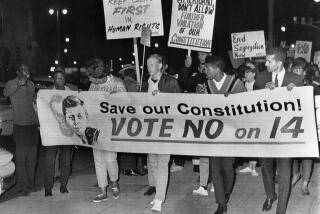Warren B. Rudman dies at 82; senator co-authored budget-balancing law
Former Sen. Warren B. Rudman, who co-authored a ground-breaking budget-balancing law, championed ethics and led a commission that predicted the danger of terrorist attacks years before 9/11, died Monday at a Washington, D.C., hospital. He was 82.
The cause was complications of lymphoma, said Bob Stevenson, a friend and spokesman.
The feisty New Hampshire Republican arrived in the Senate in 1981 with a reputation as a tough prosecutor, and he was called upon by leaders of both parties to tackle tough assignments.
In the Senate, Rudman was perhaps best known as co-sponsor of the Gramm-Rudman-Hollings budget-cutting law. He left the Senate in 1993, frustrated that the law never reached its potential because he felt that Congress and Presidents Reagan and George H.W. Bush played politics instead of insisting on spending cuts.
“People are willing to risk their lives for their country in times of war,” he said at the time. “They ought to be able to risk an election in a time of economic trouble.”
In 2001, before the 9/11 attacks, Rudman co-authored a report on national security with former Colorado Sen. Gary Hart that said a major terrorist attack on American soil was likely within 25 years.
“No one seemed to take it seriously, and no one in the media seemed to care,” Rudman said in 2007. “The report went into a dustbin in the White House.”
The report was revived after the Sept. 11 attacks, and one suggestion, forming a Homeland Security Department, was adopted.
A former New Hampshire attorney general, Rudman was named chairman of the Senate Ethics Committee in 1985, a sensitive job that many colleagues avoided.
Throughout his Senate career, Rudman was cited for his work on the Defense Appropriations subcommittee, where he supported a strong national defense but opposed expensive, high-tech weaponry.
The Gramm-Rudman-Hollings Act was approved in 1985. It was designed to end federal deficits by 1991 and required automatic spending cuts if annual deficit targets were missed.
Congress rolled back the timetable each year, and the 1991 budget that was supposed to be balanced carried the second-highest deficit in history. In 1995, 10 years after the law went on the books, Rudman lamented what could have been.
“Had we stuck to that plan, had the Congress not failed to follow it through — in fact, had presidents not failed to follow through — we would not be where we are today,” Rudman said.
During the biggest scandal of the Reagan years, Rudman, an outspoken member of the Senate’s Iran-Contra Committee, said key administration officials had showed “pervasive dishonesty” and disdain for the law by selling weapons to Nicaraguan rebels.
During the 1987 hearings, he lectured Marine Lt. Col. Oliver L. North, the operation’s key figure, about helping to hide the sale from Congress for fear it would have been rejected.
“The American people have the constitutional right to be wrong,” he told North. “And what Ronald Reagan thinks or Oliver North thinks or what I think or what anybody else thinks makes not a whit.”
Warren Bruce Rudman was born May 18, 1930, in Boston, the eldest of three children of Edward and Theresa Rudman. His father co-founded Old Colony Furniture Co.
After graduating from Syracuse University in 1952, Rudman saw combat in Korea as an infantryman in the Army from 1952 to 1954. He earned a law degree from Boston College in 1960.
From 1970 to 1976, Rudman was New Hampshire’s attorney general. He was succeeded by his deputy, David Souter, and helped persuade Bush to nominate Souter to the Supreme Court.
In a statement Tuesday, retired Justice Souter said, “A man is incomparably lucky to have had a friend that close who stood for what the founders of the American republic staked its future on.”
Rudman and his wife, Shirley, had three children.
More to Read
Start your day right
Sign up for Essential California for the L.A. Times biggest news, features and recommendations in your inbox six days a week.
You may occasionally receive promotional content from the Los Angeles Times.






